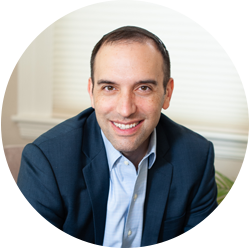Dear Friends,
Earlier this week, I attended a Boston-Haifa Café (BHCafé), a volunteer-led initiative to strengthen the bonds between CJP's Boston and Haifa-based volunteers and other interested participants. The BHCafé started during COVID-19 to help people stay connected, and we’ve held more than 60 sessions since May 2020, on meaningful topics including Peoplehood, Jewish identity, and the relationship between Israel and North America.
Our guest was Dr. Nachman Shai, Israel’s Minister of Diaspora Affairs, who opened with updates about the country and how the new government is approaching Israel’s relationship with North American Jewry and Jews around the world. After his remarks, someone asked him what we should do about American Jews who are highly critical of Israel.
Dr. Shai responded that we (Israel) have to take responsibility for the ways we can do better as a country and improve the lives of all our inhabitants – that there's more we can do – even when we cannot immediately solve our biggest challenges.
I found his answer bold and surprising as did at least one of our volunteer leaders who wrote to me in the Zoom chat: “How refreshing!”
When I reflected on why I reacted so positively to his response, I realized it had little to do with the content of the question or the answer. Quite simply, he had me at “we.”
It is so common for leaders to respond to challenging questions and (even well-intentioned) critiques by dodging, rationalizing – or worse – pointing blame at others. This Minister could easily have reacted to the question about Israel’s critics by pointing out how much they don’t understand or their political biases or the weakening of their Jewish identities. Instead, he modeled two of the most important character traits of a moral person, a moral country, a moral leader: introspection and taking responsibility.
I’m reminded of the famous quote of Rabbi Yisrael Salanter, the 19th-century founder of the modern Jewish Mussar movement:
“When I was a young man, I wanted to change the world. I found it was difficult to change the world, so I tried to change my nation. When I found I couldn’t change the nation, I began to focus on my town. I couldn’t change the town and as an older man, I tried to change my family. Now, as an old man, I realize the only thing I can change is myself . . .”
Perhaps Dr. Shai’s answer felt so countercultural to me because of how far we seem to be from Rabbi Salanter’s ethical ideals. To change ourselves, we would need to consider positions other than our own, along with the possibility that we might be wrong. From there, we could practice respectful disagreement with others’ points of view and, when appropriate, principled condemnation of their behaviors. Yet, the forces at play in our world – such as contemporary political discourse and social media – seem to prefer, incentivize, and reward outrage, blame, and vilification. In today’s climate, it takes courage for a leader to answer any challenging question with “we need to take responsibility.”
It was hard not to feel demoralized on yesterday’s one-year anniversary of January 6th which, at least this year, served more as a reminder of our brokenness than as a beacon of hope for our capacity to repair. But, as overwhelming as our challenges can feel, this day is also a reminder that tikkun – healing, bridging our divides, learning from one another (especially from those who seem so different from us), working together for the common good – begins locally. It starts right here with us; with the work we do and the way each of us chooses to live our lives every day.
It also starts with taking Rabbi Salanter’s wisdom seriously. Perhaps shifting at least some of our focus from they to we would help us to genuinely reckon with our shared past and take responsibility for our shared future.
Shabbat Shalom,
Rabbi Marc Baker

About the Author
CJP President and CEO Rabbi Marc Baker is an educator, writer, and leadership mentor who is devoting his life to Jewish learning and building Jewish communities.
